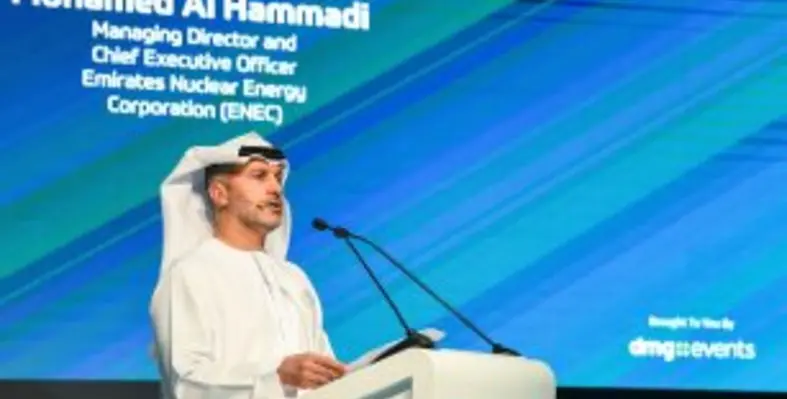The UAE has proactively invested in proven clean energy and within a decade, solar and peaceful nuclear energy have delivered a transformation of the UAE?s energy sector, ensuring the nation is ahead of the curve on achieving Net Zero by 2050
Mohamed Ibrahim Al Hammadi, managing director and CEO of the Emirates Nuclear Energy Corporation (ENEC), highlighted this during his keynote speech on day one of the inaugural World Utilities Congress, taking place this week in Abu Dhabi, UAE.
Al Hammadi identified the challenges and opportunities for the utilities sector and the solutions available today. The challenges include the fact that the energy industry needs to power the world under a new and more complex framework of energy security. The industry also needs to produce this power more sustainably, while meeting climate change commitments and preserving natural resources, and continue enabling economic growth, progress, and prosperity for the world.
Al Hammadi explained that for many years the UAE leadership has focused on sustainability, energy security and energy diversification. With the commercial operation of two of the four Units at the Barakah Nuclear Energy Plant, ENEC is delivering a climate solution today that enables rapid large-scale decarbonisation alongside growth and continues to develop nuclear technology in the UAE as a catalyst for further innovation in the clean energy transition.
?The second of our four reactors at the Barakah Plant entered commercial operations in March this year. Barakah is now generating 2.8 GW of electricity, making it the largest source of clean electricity in the country. With all four reactors online, nuclear energy will meet 25% of the UAE?s electricity demand. It has also delivered large-scale decarbonisation and when fully operational, the Plant will prevent around 22.4 million metric tonnes of carbon emissions every year,? added Al Hammadi.
There are major economic benefits too. A recent research paper by S&P Global shows that Barakah will reduce gas consumption by around 1,000 million cubic feet per day or 205,000 barrels of oil per day in equivalence. This is a financial saving of almost US$7.4bn per annum in terms of oil barrels. More importantly, Barakah saves precious natural gas resources to allow the UAE to accelerate its path to becoming a net LNG exporter by 2030.
More recently a wave of countries across Europe, the Middle East, Asia and America have also reaffirmed their commitment to this zero-carbon source. The reason behind this growth is simple - a source of high-capacity clean electricity, such as nuclear, reinforces domestic energy security, enables undisrupted economic growth whilst eliminating carbon emissions.
Al Hammadi stated that UAE companies are eagerly buying clean energy certificates as part of Abu Dhabi Department of Energy?s Clean Energy Certification scheme to demonstrate proof of the clean electricity they use, which has been produced at the Barakah Plant and Abu Dhabi?s solar facilities to access the US$30tn ESG market.








